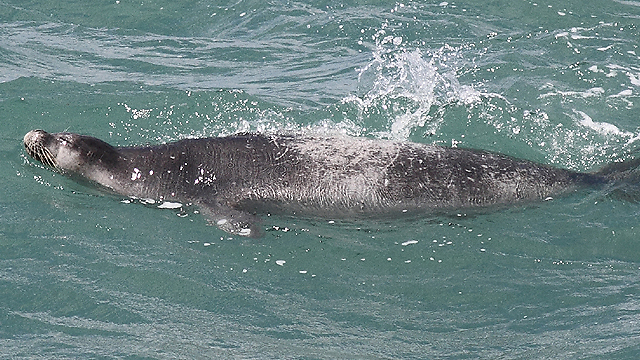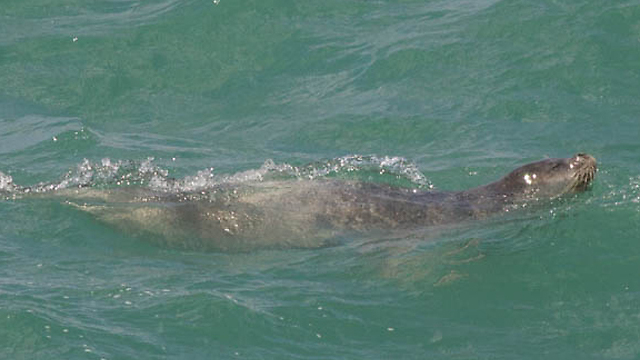 View movie clip of Rare Monk seal swimming on Israel’s coastline to hunt fish.
View movie clip of Rare Monk seal swimming on Israel’s coastline to hunt fish.
• Photographs confirm that this is the 3rd sojourn by the same endangered seal since 2010.
By Erez Erlichman
Israeli naval lookouts spotted something unusual on Monday off the coast at Rosh HaNikra – a highly endangered Mediterranean monk seal, which has become a rare sight in local waters.

Mediterranean monk seal make 3rd trip to Israel – Photo: Roei Segli
Photographs taken by experts revealed that it was not the marine mammal’s first visit to Israeli shores. The seal, which caught the navy’s attention when it crossed the maritime border between Lebanon and Israel, bore scars that showed it had been seen near Israel twice before – once in 2010 in Herzliya, and again last summer in Rosh HaNikra.
In January 2010 a female seal, battered and worn out, was sighted in Herzliya – the first such sighting in decades. Other sea lion sightings have been reported in Israel in the years since then.
According to the Society for the Protection of Nature in Israel’s guide to endangered animals, the Mediterranean monk seal lives along the northeast and southwest shores of the Mediterranean and the northwestern African coast.
The Mediterranean monk seal is considered one of the rarest types of seal in the world, and is seriously endangered.

Photo: Roei Segli
Fewer than 450 individuals are believed to live in the wild, half of which is in the area of Greece. Numbers have dwindled over the years because of hunting, destruction of natural habitats, and water pollution. Overfishing also threatens the species’ main food source.
In Israel’s coastal region, the species seems to have died out during the second half of the 20th century. Occasional sightings occurred during the 1960s and 1970s, and the last group was seen in near Beirut in 1976. Today it is believed that most of the population lives around Mauritania, Greece, and Turkey.
View original Ynet publication at: http://www.ynetnews.com/articles/0,7340,L-4647190,00.html






 Israeli New Shekel Exchange Rate
Israeli New Shekel Exchange Rate